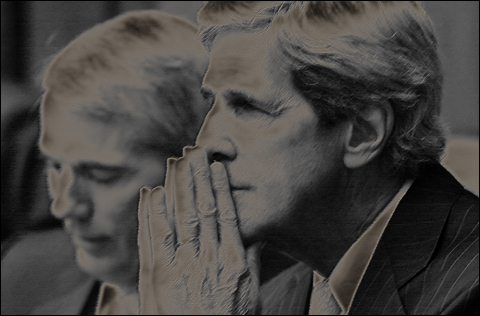
THE IMPOTENCE OF BEING EARNEST Are Kerry’s strengths — bipartisanship, compromise, honest debate — relevant in the Tea Party’s America? |
The congressional debt "super committee" has begun its work, and already there are signs that its task is hopeless. Charged with shaving trillions from the federal debt, it is plagued by Democrats who refuse to consider cuts to entitlements such as Medicare, and Republicans who reject out-of-hand any revenue increases — and reject, in fact, anything at all proposed by Democrats, especially President Barack Obama.
Unsurprisingly, Democratic senators were not exactly lining up at Majority Leader Harry Reid's door to volunteer for the three committee slots he had to assign. But one who did was Senator John Kerry — "reporting for duty," to use his infamous declaration upon accepting the Democratic nomination for president in 2004.
Popular political interpretation says that this is the latest stage in Kerry's lengthy audition for secretary of state — a job coming open if Obama wins a second term, since Hillary Clinton has said she will not serve beyond 2012.
Kerry, according to this view, is eager to leave the Senate, where he has served for 26 years — the last seven after narrowly failing to become leader of the free world. He was passed over for Clinton in 2009, and is now desperate to show his fealty and utility to Obama in any way possible.
But some who know Kerry say that people are missing the real story. Unable to become the most powerful man in the world, they say, Kerry has turned his focus on being the most effective senator he can be — as Ted Kennedy did, after losing in his own presidential bid 30 years ago. In this view, volunteering for the debt committee falls right in line with other big tasks Kerry has taken on of late, trying to save the planet from everything from global warming to nuclear proliferation.
And in fact, while cynical observers are dismissing the committee as just another inside-the-beltway stunt, Kerry sees a chance to do what needs to be done. "It's a unique historic opportunity," he says. "I take it deadly serious."
Of course he does. Kerry is almost a self-caricature of earnestness: stiff, self-important, intellectual, and grave. Throughout his career, these characteristics have contributed to Kerry's greatest moral triumphs, most notably delivering the message that the US was sacrificing men for no purpose in Vietnam — and later, pressing to normalize relations with Vietnam.
That sense of seriousness and purpose, however, provides Kerry's critics with ammunition to use against him. Enemies love to portray Kerry as elitist, prideful, patrician, and out-of-touch — and he gives them plenty of material to work with. From awkwardly botched jokes, to having a fire hydrant moved from the front of his ritzy Louisburg Square residence, to docking his yacht out-of-state to avoid taxes, Kerry has repeatedly reinforced an image that helped derail his bid for the presidency.
But while most of America — and much of Massachusetts — continues to chuckle at Kerry's foibles and quirks, he has emerged in Washington as an old-fashioned statesman.
"I think he's in his prime," says Thomas Quinn, veteran lobbyist with Venable in Washington, and once part of Ted Kennedy's campaign team. "Only three or four other senators have as strong a grasp of the issues and can articulate them as clearly."